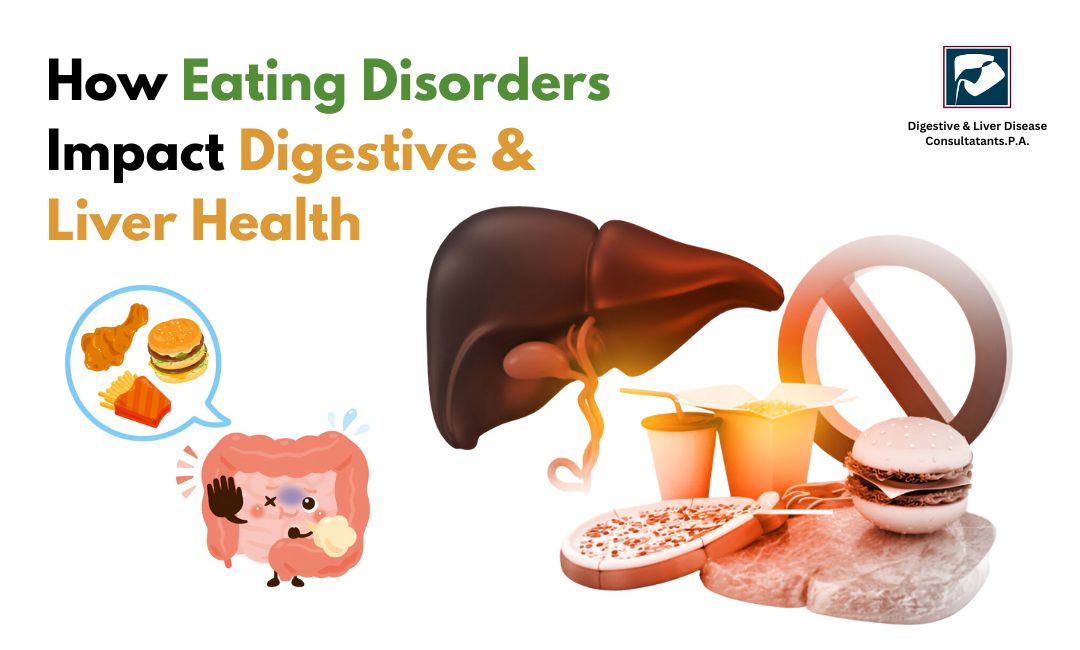Eating disorders affect millions of people worldwide and can have serious consequences for both physical and mental health. While most people associate eating disorders with weight and nutrition problems, they can also cause severe damage to the digestive system and liver. The body relies on a healthy digestive system to absorb nutrients, support immunity, and maintain organ function. When someone struggles with an eating disorder, their digestive and liver health can suffer greatly.
In this blog, we’ll explore how eating disorders impact the digestive system and liver, the potential long-term consequences, and when to seek medical help.
Understanding Eating Disorders
Eating disorders are complex conditions that affect a person’s relationship with food and eating habits. The most common types of eating disorders include:
Anorexia Nervosa – Characterized by extreme food restriction, fear of gaining weight, and severe weight loss.
Bulimia Nervosa – Involves cycles of binge eating followed by purging (vomiting, excessive exercise, or laxative use).
Binge Eating Disorder (BED) – Repeated episodes of eating large amounts of food, often leading to feelings of shame and distress.
Avoidant/Restrictive Food Intake Disorder (ARFID) – Severe restriction of food intake due to sensory issues, fear of choking, or lack of interest in eating.
These disorders can lead to malnutrition, dehydration, and severe imbalances in the body—especially affecting the digestive tract and liver.
Effects of Eating Disorders on Digestive Health
1. Delayed Stomach Emptying (Gastroparesis)
People with anorexia or bulimia often experience gastroparesis, a condition where the stomach takes too long to empty food into the intestines. This can cause:
- Nausea and vomiting
- Bloating and stomach pain
- Feeling full after eating small amounts
- Malnutrition due to poor digestion
Long-term gastroparesis can lead to bacterial overgrowth in the intestines and further digestive distress.
2. Acid Reflux and Esophageal Damage
Frequent vomiting from bulimia can weaken the lower esophageal sphincter, allowing stomach acid to flow back up into the esophagus. This leads to:
- Chronic heartburn (acid reflux)
- Esophagitis (inflammation of the esophagus)
- Barrett’s esophagus, a condition that increases the risk of esophageal cancer
The acid from vomiting can also erode tooth enamel, causing severe dental damage.
3. Constipation and Intestinal Problems
Eating disorders often cause severe constipation due to:
- Dehydration from vomiting or laxative use
- Low fiber intake from restrictive eating
- Weakened digestive muscles due to malnutrition
Chronic constipation can lead to intestinal blockages, hemorrhoids, and long-term gut dysfunction.
4. Irritable Bowel Syndrome (IBS) and Bloating
Many people with eating disorders develop IBS-like symptoms, including:
- Abdominal pain
- Bloating and gas
- Diarrhea or constipation
The gut microbiome (healthy bacteria in the intestines) is also affected by poor nutrition, making digestion even more difficult.
How Eating Disorders Harm the Liver
The liver plays a crucial role in digestion, detoxification, and nutrient storage. Eating disorders put extreme stress on the liver, leading to serious complications.
1. Fatty Liver Disease (Hepatic Steatosis)
- People with binge eating disorder may develop non-alcoholic fatty liver disease (NAFLD) due to excess fat storage in liver cells.
- Anorexia can also cause fatty liver due to the body breaking down muscle and fat for energy, overwhelming the liver with toxins.
If left untreated, fatty liver can lead to liver inflammation, scarring (cirrhosis), and even liver failure.
2. Liver Damage from Malnutrition
Severe malnutrition affects the liver’s ability to:
- Process proteins and fats
- Produce essential enzymes
- Detoxify harmful substances
Over time, this can result in liver shrinkage, dysfunction, and increased risk of infections.
3. Electrolyte Imbalance and Liver Strain
Frequent vomiting, laxative abuse, or dehydration causes electrolyte imbalances, affecting the liver’s ability to maintain fluid balance and detoxify the body. This can lead to organ failure if untreated.
Long-Term Consequences of Eating Disorders on Digestive & Liver Health
If eating disorders are left untreated, they can cause permanent damage to the digestive system and liver. Some long-term effects include:
- Chronic digestive issues (ongoing bloating, IBS, acid reflux)
- Gallstones and pancreas problems
- Liver scarring and cirrhosis
- Weakened immune system due to malnutrition
However, with early intervention and medical treatment, many of these effects can be reversed or managed.
Seeking Help: Digestive & Liver Disease Consultants, P.A.
If you or someone you love is struggling with an eating disorder and experiencing digestive or liver problems, medical attention is crucial.
At Digestive & Liver Disease Consultants, P.A., our expert gastroenterologists specialize in diagnosing and treating digestive and liver complications caused by eating disorders. Our team provides:
- Comprehensive digestive health evaluations
- Liver function testing and monitoring
- Nutritional guidance to restore gut and liver health
- Personalized treatment plans to support recovery
We work closely with dietitians, therapists, and medical professionals to ensure a holistic approach to healing.
Conclusion
Eating disorders are not just about food—they can cause serious harm to the digestive system and liver. From chronic constipation and acid reflux to fatty liver disease and organ damage, these conditions require medical attention and proper treatment.
Schedule an appointment with Digestive & Liver Disease Consultants, P.A. today and take the first step toward better digestive health!






